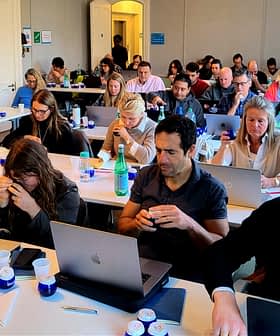The UC Davis Olive Center is offering its 12th and 13th Sensory Evaluation of Olive Oil Certificate Courses starting on June 15, 2015.
Hosted at the Silverado Vineyard Sensory Theater in the Robert Mondavi Institute for Wine and Food Science, the sensory evaluation course is for anyone looking to learn more about evaluating the quality of olive oil including producers, buyers, importers, chefs, writers, distributors and consumers.
Dan Flynn, executive director of the UC Davis Olive Center and one of the instructors for the courses said, “Anyone who wants a deep understanding of the sensory range of olive oil can benefit from taking these courses.”
In addition to Flynn, sensory training will be provided under the expert guidance of Sue Langstaff, who has led the UC Davis Olive Oil Taste Panel and is a member of the California Olive Oil Council Taste Panel, as well as Selina Wang, research director of the UC Davis Olive Center.
Sensory Evaluation of Olive oil I, a two-day course that runs from June 15 – 16th, is designed for the beginner as well as the experienced taster. Trainees will learn about the science of tasting and be educated on factors affecting sensory quality, understanding standards, defects and attributes of olive oil.
The second course, Sensory Evaluation of Olive Oil II, which runs from June 17 – 19th, will build upon knowledge gained from the first sensory course. Emphasis will be on training participants to recognize the quality of olive oil as members of a sensory panel and evaluate at least 60 olive oil samples.
Using an advanced sensory software, trainees will be able to compare their evaluation of olive oils to other tasters. Other modules of the course include discussion on sensory principles and olive oil blending.
In all, attendees of both courses get to evaluate more than 100 different olive oil samples from top producers such as Spain, Italy and Greece over the course of five days. Participants will also learn how to use olive oil in the kitchen and how to pair olive oil with different foods under the coaching provided by William Briwa who is a Chef-instructor at the Culinary Institute of America at Greystone.
In the past, the sensory courses have attracted tasters not only from the United States but from countries such as Brazil, Canada, Greece, Italy, Mexico, Peru, Chile, Australia, New Zealand and Spain. Since the first course offered in 2008, more than 600 individuals have completed the sensory courses.
See Also:UC Davis Olive Center Sensory Evaluation of Olive Oil Courses
According to Flynn, attendees use the information gained during the training in various ways. “Producers learn how to improve their processing and storage by understanding how olive oil sensory quality is influenced by processing, storage and packaging variables. Importers, buyers, and distributors learn to improve their odds of getting a better product for the price. Chefs and writers discover the wide range of quality available, get how to evaluate quality and value, and how to use olive oil in the professional kitchen and at home.”
About 125 individuals have registered for the courses so far, and there are a few seats available for those interested in attending the courses.








